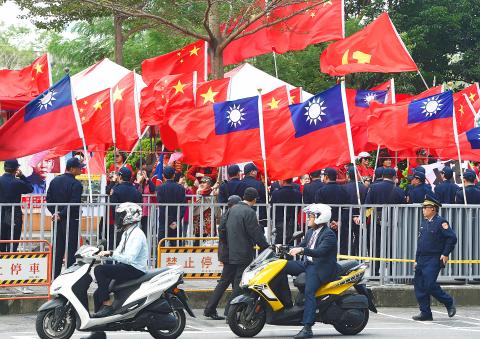Following a day of silence, the Chinese Nationalist Party (KMT) yesterday issued a statement challenging Chinese President Xi Jinping’s (習近平) definition of the so-called “1992 consensus,” saying that the “one country, two systems” framework is not part of the consensus.
“Xi’s remarks about a Taiwan version of the ‘one country, two systems’ model is not part of the content espoused by the ‘1992 consensus.’ Given that both sides of the Taiwan Strait are governed by separate governments, the ‘one country, two systems’ model unfortunately would not receive the support of the majority of Taiwanese,” the statement said.
Reiterating its definition of the “1992 consensus,” the KMT said that it was reached by the Straits Exchange Foundation and the Association for Relations Across the Taiwan Straits after they were authorized in November 1992 to engage in negotiations on the matter.

Photo: Liao Chen-huei, Taipei Times
In essence, the “1992 consensus” means that both sides of the Taiwan Strait adhere to the “one China” principle, but are allowed to have their own interpretations of what “China” means, it said.
“The ‘1992 consensus’ not only reflects the nature of cross-strait relations, which is seeking common ground while respecting differences, but also underlines the objective reality [of the ties] and conforms to both sides’ regulations,” the KMT said.
The statement came after Xi on Wednesday included “national unification” as part of his definition of the “1992 consensus” in a speech in Beijing to mark the 40th anniversary of the 1979 “Message to Compatriots in Taiwan,” which called for the unification of “China,” an end to military confrontation across the Taiwan Strait and expanded cross-strait interactions.
Xi also announced a plan to explore a Taiwan version of the “one country, two systems” model to achieve his goal of peaceful unification.
The Chinese leader’s definition of the “1992 consensus” stands in stark contrast to that provided over the years by the KMT, which has maintained that it allows room for Taiwan to interpret “China” as being the Republic of China (ROC).
The KMT’s Mainland Affairs Department on Wednesday held a meeting to discuss Xi’s speech, KMT Culture and Communications Committee acting director-general Tang Te-ming (唐德明) said.
In its statement, the KMT also reiterated its “unwavering opposition” to Taiwanese independence, saying that the ROC is already an independent sovereign state according to its Constitution.
“Cross-strait interactions and development must continue to move forward peacefully, because it is the hope of the public that both sides can expand and deepen their exchanges,” the KMT said, adding that the party, its caucus and local government leaders all look forward to making concerted efforts to ensure the peaceful development of cross-strait relations and a win-win situation for both sides.

GEARING UP: An invasion would be difficult and would strain China’s forces, but it has conducted large-scale training supporting an invasion scenario, the report said China increased its military pressure on Taiwan last year and took other steps in preparation for a potential invasion, an annual report published by the US Department of Defense on Wednesday showed. “Throughout 2023, Beijing continued to erode longstanding norms in and around Taiwan by employing a range of pressure tactics against Taiwan,” the report said, which is titled “Military and Security Developments Involving the People’s Republic of China (PRC) 2024.” The Chinese People’s Liberation Army (PLA) “is preparing for a contingency to unify Taiwan with the PRC by force, if perceived as necessary by Beijing, while simultaneously deterring, delaying or denying

PEACEFUL RESOLUTION: A statement issued following a meeting between Australia and Britain reiterated support for Taiwan and opposition to change in the Taiwan Strait Canada should support the peaceful resolution of Taiwan’s destiny according to the will of Taiwanese, Canadian lawmakers said in a resolution marking the second anniversary of that nation’s Indo-Pacific strategy on Monday. The Canadian House of Commons committee on Canada-Chinese relations made the comment as part of 34 recommendations for the new edition of the strategy, adding that Ottawa should back Taiwan’s meaningful participation in international organizations. Canada’s Indo-Pacific Strategy, first published in October 2022, emphasized that the region’s security, trade, human rights, democracy and environmental protection would play a crucial role in shaping Canada’s future. The strategy called for Canada to deepen

QUICK LOOK: The amendments include stricter recall requirements and Constitutional Court procedures, as well as a big increase in local governments’ budgets Portions of controversial amendments to tighten requirements for recalling officials and Constitutional Court procedures were passed by opposition lawmakers yesterday following clashes between lawmakers in the morning, as Democratic Progressive Party (DPP) members tried to block Chinese Nationalist Party (KMT) legislators from entering the chamber. Parts of the Public Officials Election and Recall Act (公職人員選舉罷免法) and Constitutional Court Procedure Act (憲法訴訟法) passed the third reading yesterday. The legislature was still voting on various amendments to the Act Governing the Allocation of Government Revenues and Expenditures (財政收支劃分法) as of press time last night, after the session was extended to midnight. Amendments to Article 4

‘ONE BRIDGE’: The US president-elect met with Akie Abe on Dec. 15 in Florida and the two discussed a potential Taiwan-China conflict’s implications for world peace US president-elect Donald Trump has described Taiwan as “a major issue for world peace” during a meeting with Akie Abe, the widow of late Japanese prime minister Shinzo Abe, Japanese newspaper the Yomiuri Shimbun quoted sources as saying in a report yesterday. Trump met with Akie Abe on Dec. 15 at the Mar-a-Lago estate in Florida, where the two discussed the Russo-Ukrainian war and the situation in the Taiwan Strait. During the meeting, Trump spoke on the implications for world peace of a potential Taiwan-China conflict, which “indicated his administration’s stance of placing importance on dealing with the situation in